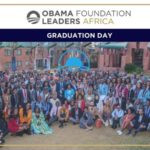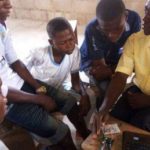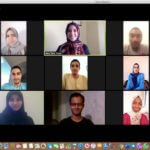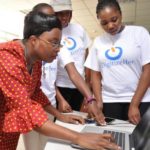Impact Stories from Professional Growth Policy Area

Fellow completes Obama Foundation African Leaders program
Fellow(s): Refilwe Ledwaba
Country: South Africa
Cohort: 2019
Policy Area(s): Empowering Women and Girls, Professional Growth, Youth Engagement
Recently, 2019 fellow of South Africa Refilwe Ledwaba completed the Obama Foundation African Leaders program. The program seeks to build a growing network of innovative and ethical changemakers who will drive positive change in their communities and beyond. During the year-long program, 200 emerging African leaders attend seminars focused on values-based leadership development, skill-building for social change, hands-on service learning and technical trainings.
Refilwe, South Africa’s first black female helicopter pilot, is the founder of the Girl Fly Programme in Africa (GFPA) Foundation, a non-profit organization empowering young women to go into STEM. Through the GFPA Foundation, she is addressing the challenges she faced when she entered the aviation industry by creating more access to opportunities for women, having learned ways to multiply her impact through the programs she has participated in. Refilwe says her biggest lesson learned from getting to know emerging leaders from all over the world through the TechWomen and Obama Foundation Leaders programs is to “continually challenge yourself and get out of that comfort zone.”
Report Date...: 8/3/2020

Fellow advocates for diversity and inclusion in magazine feature
Fellow(s): Lilian Motongori
Country: Kenya
Cohort: 2019
Policy Area(s): Empowering Women and Girls, Professional Growth
2019 fellow of Kenya Lilian Motongori was featured in the lifestyle magazine, Vuuqa. For the Women’s Month Special issue, Vuuqa highlighted the work of women leaders in Africa who are making strides in their respective industries.
In her feature, Lilian talks about how staying persistent and believing in herself pushed her to study engineering when she was younger, allowing her to become the mechanical engineer and renewable energy expert she is today. She is also the co-founder of Women in Energy Africa, a platform that empowers women and girls in the green tech fields. Lilian highlights the need for more inclusive representation in STEM: “For far too long [women were] sidelined in decision making tables yet we matter, too” she says. “There is beauty and importance in diversity as it brings in new ideas and understanding to all parties involved.”
Report Date...: 8/3/20

Fellows host webinar on intersection of motherhood and STEM
Fellow(s): Houda Chakiri, Unity Chipunza
Country: Morocco, Zimbabwe
Cohort: 2012, 2013
Policy Area(s): Empowering Women and Girls, Professional Growth
Recently, 2012 fellow of Morocco Houda Chakiri facilitated the webinar “The voices of Moms in Tech during COVID-19,” in partnership with AfChix, a network for supporting African women in technology. The online panel included 2013 fellow of Zimbabwe Unity Chipunza and other women who shared their experiences of being working mothers in the STEM field, especially in light of the pandemic. The webinar is part of a series that was originally part of the cancelled TechWomen Summit meant to be held in Kinshasa, Democratic Republic of Congo earlier this year. As the summit’s theme was “A Spectrum of Opportunities,” the topic of this panel and upcoming panels focus on cultivating inclusion.
During the webinar, Unity, an educational technologist at the Bindura University of Science Education, talked about overcoming the stigma of thinking e-learning as only for distance learners during the pandemic and how e-learning methods could be adapated towards any sort of curriculum, highlighting that children will be drawn to learning if given the right resources. Houda, a specialist in e-Government solutions, concluded the panel by encouraging attendees to instill hope in the children they are raising through the pandemic: “Moms are coping with the problems we have everyday and trying to solve them,” she says. “But the new generation can give us the solution by seeing this situation from the outside.”
Report Date...: 7/27/20

Fellow shares insights on using open source tools for teaching
Fellow(s): Chioma Ezedi
Country: Nigeria
Cohort: 2016
Policy Area(s): Education Diplomacy/Mentoring, Professional Growth, Youth Engagement
TechWomen mentors Jessica Dickinson Goodman and Fatema Kothari, both board members of the Internet Society of the San Francisco Bay Area, recently started a blog series on the organization’s website, highlighting tech leaders from outside of the United States. Chioma Ezedi, 2016 fellow of Nigeria, contributed to the series, writing about how she is using open source tools such as Arduino to teach computer science in rural Nigeria.
Chioma is a software developer who is passionate about education technology and currently serves as a project lead and mentor at STEMTeers, an initiative to inspire, engage and promote children and youth into STEM. In the blog post, she outlines the challenges STEM education is facing in Nigeria due to the lack of infrastructure and equipment, which has been further exacerbated by schools closing due to the pandemic. With the increasing availability of open source resources being iterated and improved upon, she sees the opportunity for them to enhance students’ learning during this time and beyond: “I realized Open Source is for more than free tools, software or hardware; it was a great opportunity to learn, learn by building and create with innovation.”
Report Date...: 7/27/20

Fellow featured in 1 Million Women in STEM Campaign
Fellow(s): Nabila Bashir
Country: Jordan
Cohort: 2018
Policy Area(s): Empowering Women and Girls, Professional Growth
2018 fellow of Jordan Nabila Bashir was recently featured as one of the role models for the 1 Million Women in STEM Campaign, a campaign seeking to profile the experiences of one million women working in STEM to promote visible role models to the next generation of girls.
Nabila, as the director at the Queen Rania Teacher Academy, helps educators gain STEM professional development opportunities. She credits her time in TechWomen for empowering her to drive change in her community. “Being mentored by a group of professional women mentors through the TechWomen program assured [me] that women need support and role models to excel in their careers and that had a huge impact on my career,” she writes. “So, technology should empower leadership to drive change in community especially through education of girls, mentorship and support.”
Report Date...: 7/27/20

Fellow(s): Alaa Khoja
Country: Libya
Cohort: 2019
Policy Area(s): Education Diplomacy/Mentoring, Empowering Women and Girls, Professional Growth, Youth Engagement
This week, 2019 fellow of Libya Alaa Khoja celebrated the completion of Teccamp, an eight-week web and mobile app course for young students in Libya. Teccamp is run through Alaa’s employer, Tatweer Research, a company that educates and empowers Libya’s young entrepreneurs. Alaa works as their community development officer, responsible for selecting Teccamp’s trainers and applicants as well as supervising the program. Teccamp’s goal is to instill in its graduates an entrepreneurial spirit, inspiring them to start businesses of their own.
Originally planned to be in-person, the course was moved online due to the COVID-19 pandemic. Alaa and her team also faced internet issues and persistent 10-hour power outages, requiring them to try different technologies and work together to usher the students through the learning process. Ultimately, their students – mostly comprised of university students and new graduates — were trained in front-end and back-end languages, database design and app development. Trainees also applied their knowledge to innovative projects that they presented at the conclusion of the course. “Teccampers went through a lot this time,” said Alaa. “But nothing inspired me more than their stamina and their love of learning.”
Report Date...: 7/20/20

In guest blog fellow reflects on creating the “Silicon Savannah”
Fellow(s): Josephine Ndambuki
Country: Kenya
Cohort: 2013
Policy Area(s): Economic Impact, Empowering Women and Girls, Entrepreneurship, Professional Growth
In the latest post on the TechWomen blog, 2013 fellow Josephine Ndambuki reflects on her TechWomen experience and career trajectory that led her to helping create a groundbreaking project in Kenya.
Josephine is the manager for economic development, partnerships and resource mobilization for Konza Technolopolis Development Authority, a flagship project south of Nairobi that is part of Kenya’s Vision 2030 economic development portfolio. Konza Technopolis will be a world-class mixed-use walkable city and innovation hub with ICT, engineering and life sciences sectors. “My acceptance to the TechWomen program signified a new turn; it was the wind that propelled me in the direction of my passion,” Josephine writes. In the post, she recalls visiting an accelerator program in Silicon Valley and learning about tech founders at the forefront of innovation: “As I looked at the company logos in the ‘wall of fame’ I couldn’t help but wonder what it would take for Kenya to have the same thing.” Phase one construction has begun on the tech city, which is projected to create 17,000 direct jobs when it’s completed.
Report Date...: 7/20/20

Fellows host live session for TechWomen seed grant project
Fellow(s): Asna Javed, Ayesha Mumtaz Kahn, Asmara Rahat, Farhat Yasmeen and Zeenat Anjum
Country: Pakistan
Cohort: 2019
Policy Area(s): Education Diplomacy/Mentoring, Entrepreneurship, Professional Growth
Recently, the 2019 TechWomen seed grant-winning team who created Bachaoo held a live session on dealing with the trauma of child sexual abuse. Fellows Asna Javed, Ayesha Mumtaz Kahn, Asmara Rahat, Farhat Yasmeen and Zeenat Anjum founded Bachaoo in order to create awareness around child sexual abuse and advocate for children and victims in Pakistan.
Their Facebook Live session featured Ambreen Qureshi, an integrative therapist who spoke about the different types of trauma, shared how parents can identify signs of sexual abuse and gave tips on how to reach out to mental health professionals. Soon, the fellows will host another Facebook Live conversation with an educationist and therapist on children’s emotional health. “Overall, we are making great progress,” says Asna. “We have more than 2,000 followers now. People are reaching out to us and want to be a part of the cause.”
Report Date...: 7/20/20

TechWomen alumnae offer advice and inspiration for TechGirls
Fellow(s): Azhar Mambetova, Dalel Mansour, Faten Khalfallah, Ghada Ameen, Nisreen Deeb, Sara Dib
Country: Algeria, Egypt, Kyrgyzstan, Lebanon, Tunisia
Cohort: 2013, 2015, 2018, 2019
Policy Area(s): Economic Impact, Education Diplomacy/Mentoring, Empowering Women and Girls, Entrepreneurship, Environmental Sustainability, Professional Growth, Youth Engagement
Recently, TechGirls created a resource for TechGirls participants and girls interested in STEM fields to hear from TechWomen fellows, receive mentorship and learn about careers in STEM. Profiles of Women in STEM features TechWomen fellows from Algeria, Egypt, Kyrgyzstan, Lebanon and Tunisia who created videos sharing their career journeys and the lessons they learned along the way.
Fellows Azhar Mambetova (Kyrgyzstan, 2019), Dalel Mansour (Tunisia, 2015), Faten Khalfallah (Tunisia, 2015) Ghada Ameen (Egypt, 2018), Nisreen Deeb (Lebanon, 2013) and Sara Dib (Algeria, 2019) participated in the initiative, highlighting their career wins and challenges, and offering advice for girls who are curious about STEM. “I chose to teach in technology because I wanted to inspire others…and you can inspire others too,” said Faten, who also gave advice for finding a career in STEM: “I advise all the TechGirls, all the girls, to discover many domains and many subjects. I advise them to choose the career that you love,” she said. Azhar chronicled her career in banking and fintech, speaking about what drives her to mentor others: “In my career, I hadn’t had a lot of role models…and at some point, I decided I can become one,” she said. Nisreen presented on her experience as a woman in tech, encouraging girls to raise their voice, ask for help and give back to their community. “I’m really proud to be a woman in tech,” she said. “Why? Because we can inspire, we can give back to our community and we can help other people.”
Report Date...: 7/13/20

Fellow named to Women in Africa 54 list
Fellow(s): Ameni Mansouri
Country: Kenya, Tunisia
Cohort: 2018
Policy Area(s): Entrepreneurship, Professional Growth
2018 fellow Ameni Mansouri is one of 54 African women entrepreneurs awarded the WIA54, an initiative that recognizes start-up founders that are shaping the future of Africa. The project is part of Women in Africa, a platform that supports the economic development of leading and high potential African women. They also have an institute dedicated to sharing knowledge around gender-related issues and developing proposals for the inclusion of women in African economies.
WIA54 selects one woman entrepreneur from each African country, chosen for their innovation, ambition and success in the market. Ameni is the co-founder and CEO of Dabchy, the first fashion social network in Tunisia where users can buy and sell used clothing online. The 54 selected entrepreneurs will gain access to one year of mentorship from large companies, features on the WIA platform and networking opportunities with top leaders.
Report Date...: 7/13/20

